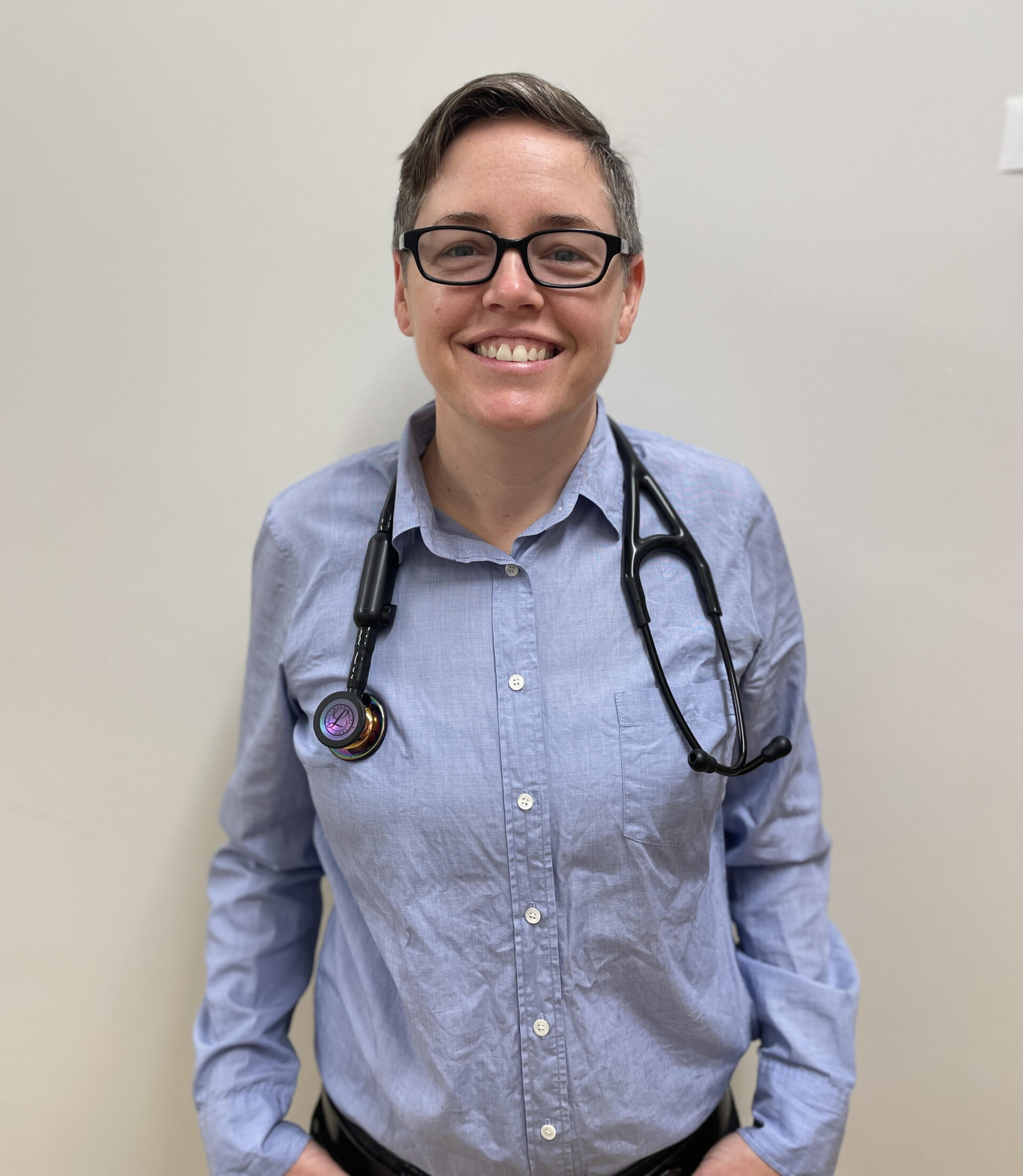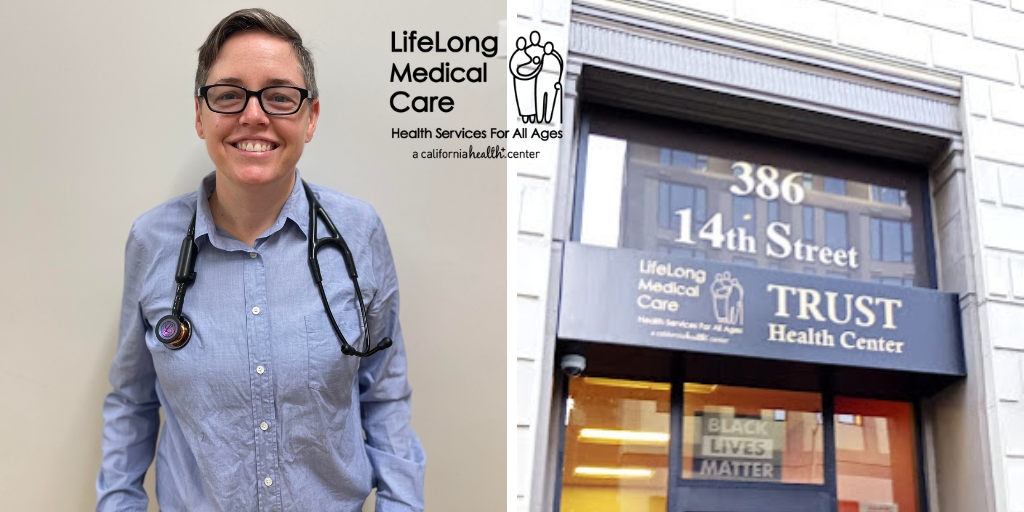Interview with Dr. Meggie Woods
Our community health centers are mission-driven to provide the most accessible and equitable healthcare to all who walk through their doors. They have always provided quality care to all members of our communities by reducing barriers through linguistically appropriate and culturally competent and congruent care delivery systems. They’re continuing to grow, shift, and respond to the evolving needs of our most vulnerable community members and as a result are continuing to pave a more direct path towards health equity for all.
We recently sat down with Dr. Meggie Woods, Lead Clinician at LifeLong Medical Care to learn more about their patient-centered care, especially as it relates to our LGBTQIA+ and Trans community members.
 Name: Dr. Meghan (Meggie) Woods, (they/them)
Name: Dr. Meghan (Meggie) Woods, (they/them)
Title: Lead Clinician, LifeLong Medical Care, TRUST Clinic
Guiding Quote: Try your hardest, and do your best. – Dan Woods, my dad
Alameda Health Consortium: Tell us a little but about yourself.
Dr. Meggie Woods: I grew up in Southern California. My dad was the first in his family to go to college and my mum immigrated from Australia when they got married. My parents raised me with a strong sense of responsibility to serve others in need. I graduated from Brown University with concentrations in International Relations and Latin American Studies. In my early career, I was an HIV case manager. This work inspired me to pursue medicine. I attended medical school and Family and Community Medicine residency at University of California, San Francisco (UCSF) and I completed the HIV medicine track during residency where I earned my HIV Specialist certificate.
Four years ago, I became a primary care provider at TRUST clinic at LifeLong Medical Care where we offer integrated primary care to people experiencing homelessness in Oakland, CA. I am the Lead Clinician and run the HIV, substance use and gender affirming care programs. I am board certified in Addiction Medicine. I am a site Principle Investigator for a National Institute of Health (NIH) grant studying the effects of mobile and drop-in care models for people living with HIV and experiencing homelessness. I am also a volunteer clinical professor in the UCSF Family and Community Medicine department.
At TRUST Clinic, we meet people when they are often at the lowest point in their life.
AHC: What was it about community health centers (CHCs) that drew you to their work?
MW: The appeal of a career in family medicine to me is using science to serve others. I sought out global health opportunities in Kenya, El Salvador, and Haiti during my medical training. As a newly minted Family Medicine physician, I volunteered in the largest refugee camp in the world, in Bangladesh. In 2017, the Rohingya people fled genocide in Burma to this mountainous forest region on the Bangladesh-Burma border. While I enjoyed my global health work, I felt limited in my role as a foreign physician because of the linguistic and cultural barriers. I wanted to work in my community and use my skills in HIV medicine and gender affirming care. I was incredibly lucky to learn about TRUST Clinic from a close friend who already worked at Lifelong. I met with Dr. Jason Reinking, Associate Medical Director, who recruited me for my precise background and interests. I did not realize back then how vital Community Health Centers are to their communities. By providing comprehensive primary care in a single location, low-income patients can access the care they need without stigma or logistical barriers. I find this model appealing because I want to take care of the most vulnerable and difficult to engage in care.
I feel incredibly honored and humbled to walk with my patients on their journeys.
AHC: In your role as a primary care provider at LifeLong Medical Care’s TRUST Clinic, what are often some of the barriers you experience in providing care for people experiencing homelessness?
MW: People experiencing homelessness face myriad barriers to staying healthy. For example, without a safe place to sleep at night, many rely on stimulants to stay awake. Without bathroom access, many will forgo diuretics to avoid urinating in public places. My patients lack consistent access to healthy food, which makes treating conditions like insulin-dependent diabetes challenging. These kinds of barriers all compound each other, and the result is that people experiencing homelessness die on average 20 years younger than people who have secure housing.
At TRUST Clinic, we meet people when they are often at the lowest point in their life. We have hot food and hygiene kits to meet immediate needs. New patients have many items on their “to do” list, after spending years without healthcare or being discharged from the hospital after a critical illness. We can see patients as often as needed and chip away at that list. We try to provide as much as possible in-house. Our entire team of providers, MAs, RNs, health and wellness coaches, case managers, recovery support counselors, therapists, psychiatrists, and triage staff are trained in trauma-informed care in order to approach our patients with greater understanding and empathy for what they have experienced in life. Our philosophy of care is deeply rooted in harm reduction. Our patients come to us for help, but that help must make sense for their lives.
I work with patients in depth to understand what their daily life is like to craft customized medication regimens which are reasonable for a patient, given their constraints. I avoid diuretic blood pressure medicine, for example, if I know someone is rough sleeping- sleeping outside without adequate shelter. I reach for a weekly injectable diabetic medicine that can be given in the clinic before starting a diabetic patient on insulin. TRUST Clinic has a robust behavioral health department that patients seeking psychiatry and therapy can easily access. We receive patient medications when they have no address and get robbed frequently. Our nurses give injectable medications such as long-acting buprenorphine, long-acting antipsychotics, hormones, and HIV medicines. This helps patients who struggle to take pills regularly adhere to their treatment plans. We stock a wide range of harm reduction supplies such as naloxone, safe injections kits, fentanyl test strips and talk openly and nonjudgmentally about substance use. Our goal is to prevent overdose deaths and not impose a moral judgment. Our support staff of health and wellness coaches, intensive case managers, HIV case managers and Recovery Support Counselors are incredible at helping patients navigate the healthcare system – from switching county health plans to scheduling a specialist appointment and arranging transportation.
Transgender people have always existed, but transphobia has kept us in the shadows until recently.
AHC: Barriers to accessing appropriate and culturally competent care can contribute to health disparities in transgender persons. Can you share more about what these disparities look like and why they exist in this community?
MW: The biggest disparities for transgender people are safety, access to medical care, and respect for their autonomy (the right to identify with their lived name and pronouns and have that identity be respected). Transgender people have always existed, but transphobia has kept us in the shadows until recently. However, increased visibility has not translated into increased safety. In 2022, 32 transgender people were murdered, the majority of whom were BIPOC (Black, Indigenous, People of Color). According to Trans Legislation Tracker, 558 anti-trans bills have been introduced in 49 states this year. These sobering statistics demonstrate the real dangers that transgender, and gender diverse people face today.
Finding a trans-competent provider still largely depends on word of mouth. Most medical providers have received little to no exposure to gender affirming care. The logistical hurdles to changing your name are onerous and time-consuming. This can result in medical staff and providers using the wrong name and/or pronouns, despite their best intentions.
AHC: In what ways are Community Health Centers uniquely positioned to provide care for members of the LGBTQIA+ and Trans communities?
MW: Community Health Centers can offer a full spectrum of services for our queer and transgender communities. Sexual health services like PrEP and STI testing can be integrated into primary care clinics or separate spaces. Hiring queer and transgender staff at all levels who reflect the identities of our patients helps create safe spaces. Medical providers prescribing hormones are just one part of that. Therapists who are familiar with writing gender affirming surgery letters of support and support staff skilled at navigating the legal name change process help transgender and non-binary patients’ transition.
At TRUST Clinic, I conduct regular training with our staff on gender-affirming care and queer health issues. We help our transgender and gender diverse patients access gender affirming surgeries, hormones and assist with legal transition. Many patients previously thought they were not eligible for these life-saving treatments because they were experiencing homelessness. We have partnered with local surgeons who accept Medi-Cal and Lifelong’s Adeline Street Recuperative Care to provide a safe place to recover post-operatively. These relationships have allowed our patients to realize their gender affirming goals.
In addition to hiring staff, the physical space of a clinic must reflect the values held. In response to feedback about confusion regarding why we were asking about pronouns, we put up signs in the exam rooms explaining what pronouns are and why they’re important.
AHC: Is there anything else you wish to share about your journey and your work with historically marginalized community members?
MW: I came out as queer in college. Gay marriage was still illegal, and most people had a very narrow understanding of gender. While I always considered myself to be genderqueer and non-binary, I didn’t start using they/them pronouns until a few years ago. Providing gender affirming care has been one of the most rewarding parts of my medical career. The relief on a patient’s face when we meet for the first time, and I ask their name, pronouns, and gender-affirming goals is profound. They can be themselves with me, because I trust them to know what the right path for them is. Sometimes, my exam room is the only place in their lives where they can be their authentic selves. It’s not safe elsewhere. We work together to find the right therapist, identify social supports and over time, I start to see positive shifts in gender expression, confidence, and circumstances. I feel incredibly honored and humbled to walk with my patients on their journeys.
You can learn more about LifeLong Medical Care HERE.
